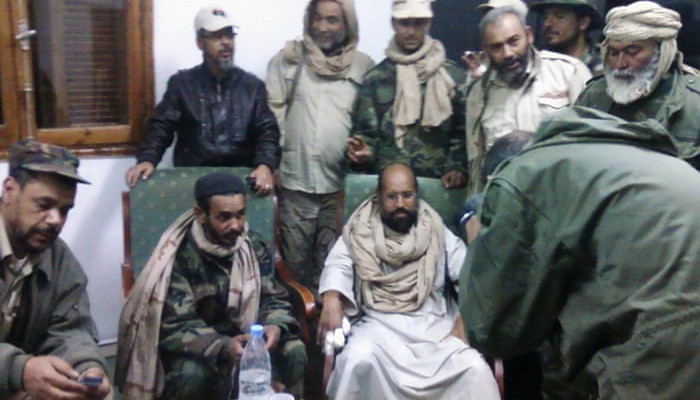The rehabilitation of Saif-al-Islam

Could Qadhafi’s former heir apparent stage a comeback in Libya?
Ten years after his father was deposed and brutally murdered after ruling Libya for 42 years, Seif-al-Islam al-Qadhafi is back in the headlines. His lengthy interview with The New York Times published on Friday suggests there is renewed Western and Arab interest in rehabilitating the former ‘heir apparent’.
This is mainly due to the miserable condition of the country a decade after the US, Britain and France spearheaded the NATO military assault that toppled the regime – and handed its head over to be lynched and mutilated by ‘revolutionaries’ – without preparing a better alternative. Their intervention was a purely vindictive act aimed at eliminating a recalcitrant leader, each for their own reasons, with no consideration for the interests or wellbeing of the Libyan people.
Saif made plain during the interview that he has political ambitions and wants to return to power to restore Libya’s unity after ten years of chaos. He said the current political class had brought nothing but misery to the country, and what happened in 2011 was not a revolution but a ruinous civil war. He claimed he had been free since his release from detention in 2017 and his former captors (from the Zintan tribal militia) were now his friends, and indicated he might contest any presidential elections that are called.
There is no doubt that many Libyans feel nostalgic for the past and regret the overthrow of Qadhafi’s regime, as Saif-al-Islam said. But he did not put forward any political programme. He still considers his strongest card to be the fact that he is the son of the former leader who provided Libyans with security and stability in contrast to the current dire situation.
But nostalgia for a past in which Libya was at peace, benefited from its oil wealth, and made its mark on the world (especially in Africa), is not sufficient. The world has changed and what worked 40 years ago might not work now. The Libyans have changed too. Sixty percent are young people aged under 30, and half of those have no memory of the Qadhafi era. The Qadhafi regime also had its faults: autocratic rule, the denial of freedoms and stifling of dissent, and the absence of proper state institutions.
It is fair to say that Saif — who lost three of his brothers in the war waged on Libya by NATO and its allies — tried to introduce economic and political reforms when he was being groomed to succeed his father. He reached out to opposition figures, released many political detainees, eased restrictions, enabled exiles to return, and involved some of them in running the country. But his ‘reformist’ project faced constant resistance from his father and groups close to him and ultimately achieved modest results.
The question now is whether Saif stands a real chance of returning to power, and what are the local and international impediments to his ambitions?
His main asset is the failure of the ‘revolutionaries’ and their backers to create a better alternative to the Qadhafi regime over the past decade. Their infighting and power-struggles, carve-up of the country, rampant corruption and thieving of public funds, and the anarchy of arms and militias, are all factors that improve the prospects of’ Qadhafi Jr.’ if he is allowed to run for president – especially in the absence of any charismatic rivals capable of convincing Libyans they could reunite the country and address their legitimate demands. Moreover, Saif still has a base of tribal support in a country where tribes are an important factor.
But he also faces many obstacles. Chief of these is the International Criminal Court indictment and extradition demand hanging over him for crimes against humanity. He could argue that unlike his brothers, he never played a military role or commanded a brigade in 2011. He could also point out that there are many countries, not least the United States, that do not recognise the ICC or its rulings. It is ironic that he and his father’s opponents who overthrew the regime because of its abuses have committed far worse abuses since they took power, as well as turning Libya into one of the most corrupt countries on earth.
In brief, a long road lies ahead if Saif-al-Islam al-Qadhafi is to achieve his ambitions and return to the pinnacle of power. But the attention accorded to him by The New York Times is one of several signs that a comeback cannot be ruled out.
https://www.raialyoum.com/index.php/the-rehabilitation-of-saif-al-islam/
 TheAltWorld
TheAltWorld 
0 thoughts on “The rehabilitation of Saif-al-Islam”